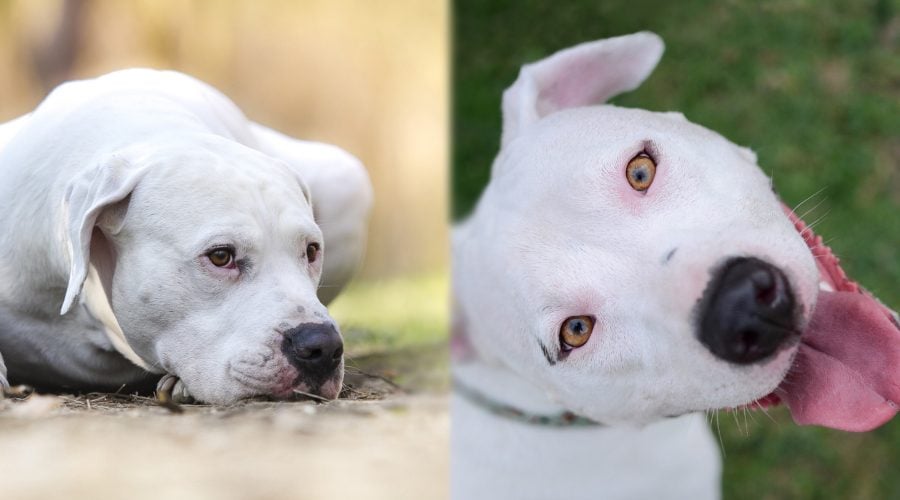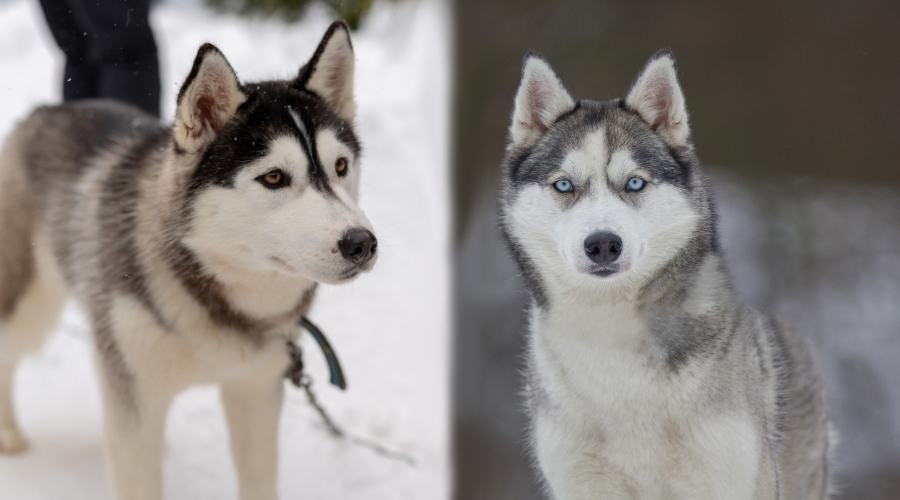Border Collie vs. German Shepherd: Breed Differences & Similarities
When you purchase through links on our site, we may earn a commission. Here’s how it works.
Are you comparing the Border Collie vs. the German Shepherd for your next canine companion? The Border Collie and the German Shepherd are purebred dogs known for their protective nature, but there are definite differences between them. If you’re looking for a dog for your family and considering adopting either breed, you must know what sets them apart.
Table of Contents
Both dog breeds are well-known, and for good reasons. They’re both beautiful, energetic, and, when raised properly, friendly dogs. While neither is ideal for people completely new to raising dogs, experienced and loving dog owners can have a wonderful time caring for either dog.
Before welcoming one into your home, we are here to help you learn everything you need to know about both Border Collies and German Shepherds. You’ll see the key similarities and differences between both breeds with clear compare-and-contrast. Let’s jump in and find out which of these two working dogs best suits your lifestyle.
Breed Comparison
- Height18-22 Inches
- Height23-25 Inches
- Weight27-55 Pounds
- Weight60-80 Pounds
- TemperamentSmart, Hard-working, Energetic
- TemperamentActive, Intelligent, Loyal
- EnergyIntense
- EnergyHigh Energy
- HealthAbove Average
- HealthAverage
- Lifespan12-15 Years
- Lifespan7-13 Years
- Puppy Prices$1,000 and Up
- Puppy Prices$1,000 and Up
Key Differences
- German Shepherds are much larger. GSDs weigh between 60 and 85 pounds, and Border Collies weigh 27 to 55.
- GSDs are more popular than Border Collies.
- Border Collies are higher-energy and need more exercise.
- German Shepherds need more grooming.
- Border Collies have a longer expected lifespan, 12 to 15 years. GSDs live about 7 to 13 years.
- German Shepherds are more territorial and aggressive.
- The Border Collie has a softer, silkier coat.
- Both breeds are affectionate, but Border Collies are friendlier yet shyer.
Breed History
Both breeds have fascinating backstories, starting with when first sired. Learning about their breed history can also give you a better understanding of their temperaments. Because both dogs were bred for slightly different purposes, they will each lend themselves better to different family situations. Let’s take a deeper look at the history of each breed.
Border Collie
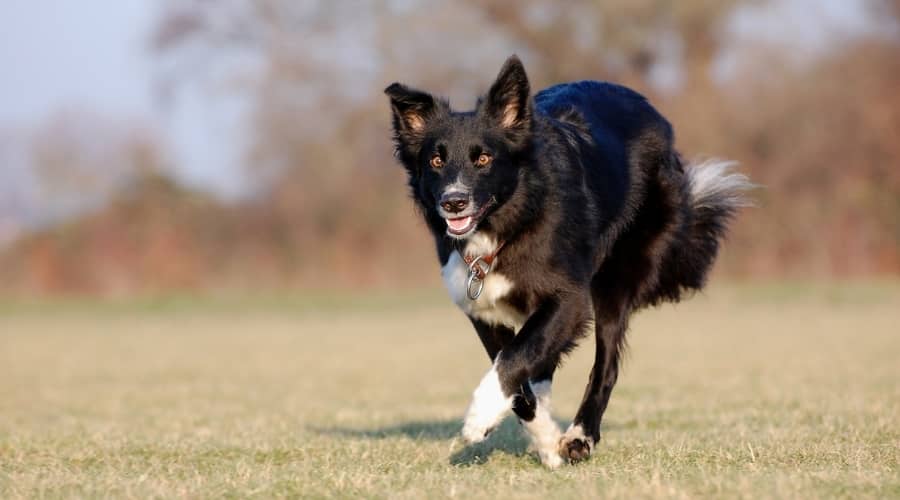
You can trace the Borer Collie’s lineage to the Roman Empire and Vikings. As the Roman Empire fell apart, Vikings began to conquer Britain. Crucial to their success was the help of their herding dogs. However, dogs from the Roman Empire stuck around. Mating between dogs from different cultures led to one of the smartest breeds ever known.
Although they’re no longer exclusively working dogs, Border Collies are still renowned for their herding abilities. Many animal experts tout them as the smartest breed of dog. They’re also very popular. The American Kennel Club (AKC) listed them as the 33rd most-popular breed on their yearly list.
German Shepherd
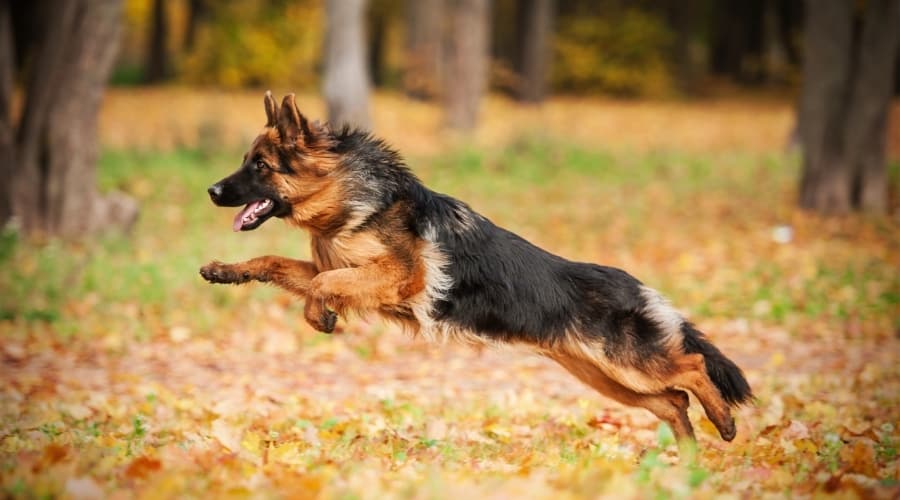
German Shepherds are far more popular than Border Collies. In fact, they are the second-most popular dog breed in the world. While they’re largely associated with police and military use, they were initially used for herding purposes, as their name suggests.
They came from Germany in the 19th century and descended from top herding dogs. There are actually two different breeding lines: American and European variants of the breed. If you travel to Europe, you might see them referred to as “Alsatians.” They received this moniker amidst anti-German sentiment during World War II, and it stuck in some places. Arguably, the most famous dog is Rin Tin Tin, the popular dog movie star who appeared in 27 films.
Appearance
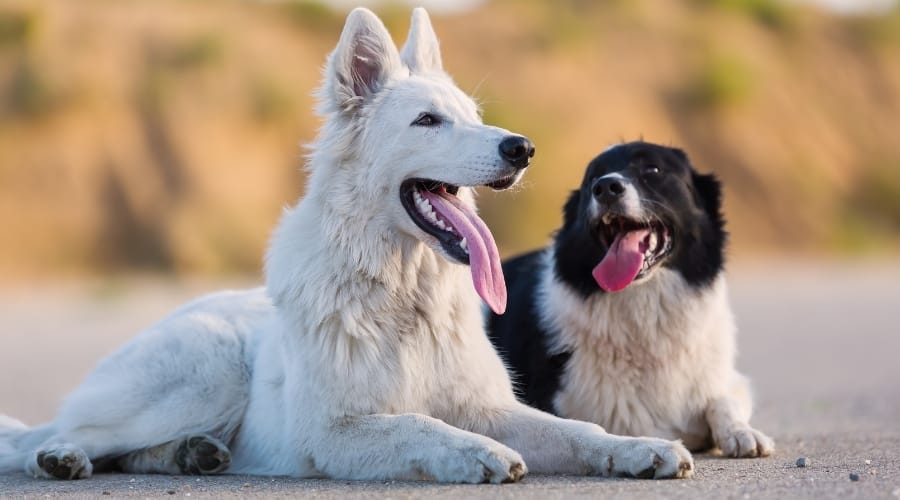
There’s no mistaking these breeds when it comes to looks. German Shepherds weigh more, with full-size dogs weighing between 60 and 80 pounds. By comparison, full-size Border Collies weigh between 27 and 55 pounds, respectively.
The dogs are fairly close when it comes to height, but German Shepherds are taller. Males measure 25 inches tall, while females measure 23 inches tall. Comparatively, male Border Collies are 20 to 22 inches tall, and females measure roughly 18 to 20 inches tall.
Border Collie coats can be coarse, smooth, or both. Their fur tends to be black and white. However, it’s not unheard of for dogs to have blue, red, or gold tones. They can also have solid coats, and these are usually sable-colored dogs.
Universally, German Shepherds have medium-length, or long coats, which depend on the dog and their genetics. Their coats are typically black and tan. However, some dogs will have solid-colored coats, coming in black, blue, and the more controversial white variety.
Temperament
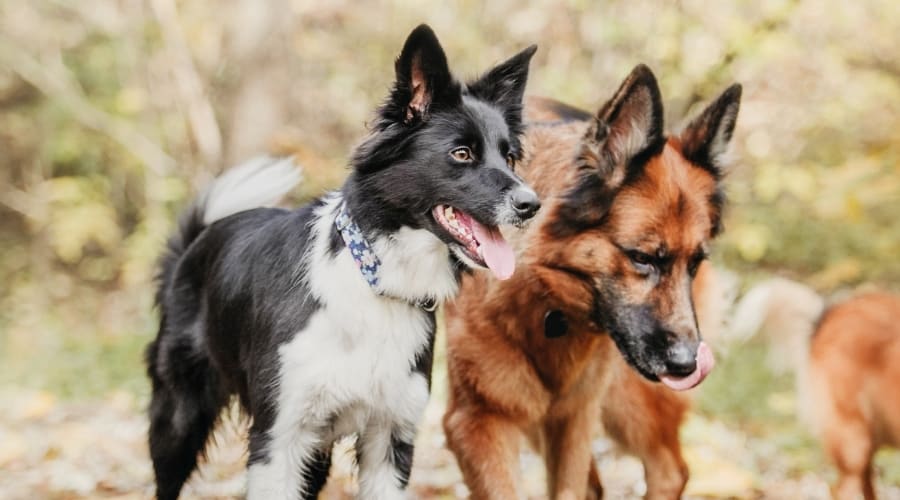
Surprisingly, both dog breeds have more in common than they might seem to. They are both working breeds and extremely smart. They are both also very loyal to their owners. For Border Collies, that can mean shyness around strangers. German Shepherds tend to be more open to interactions with strangers but can be more territorial of their own homes and yard.
Both breeds are very territorial and serve as excellent guard dogs, but neither barks very often. However, they can both be pretty mouthy and are prone to nip. Border Collies are very unlikely to bite people or other dogs. German Shepherds are thought to have a higher bite risk, but this usually comes down to training, not the dog. Unfortunately, they are sometimes labeled as aggressive as a result.
Both dogs are very lovable and playful. They can become very attached to their owners. However, Border Collies have much greater risks of separation anxiety. Neither dog will do well if left alone for long periods of time. You may want to consider another dog if you aren’t home frequently.
The home setting is very important for both dogs. They both need plenty of exercise. Therefore, apartment living is not ideal for either breed of dog. Be cautious if you have another dog already. While Border Collies can be friendly with other dogs, German Shepherds will need to be introduced and socialized early on to make them well-behaved in a multi-pet household.
If you have kids, both breeds can be an excellent choice. They’re each very friendly around children. They also generally tolerate other pets, such as cats. However, it’s not always the most loving relationship.
Exercise
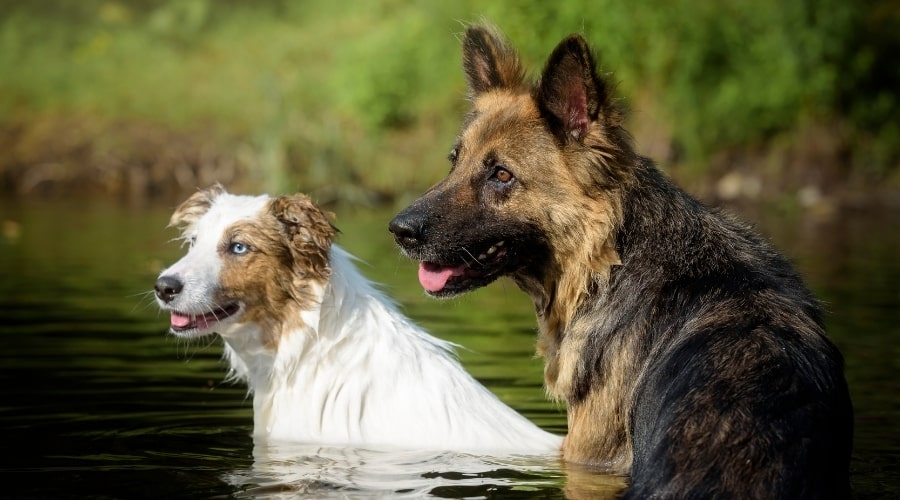
Both breeds require at least one hour of vigorous exercise each day. When you take them out to use the bathroom, you should extend the walk to help them release their energy. A fenced-in backyard is also very helpful, as it gives them a chance to romp around when you might be preoccupied with other responsibilities.
Take them to the park on your days off to give them as much free space as possible. A leash is a necessity, of course. You might consider taking them to the dog park. However, it would be best if you kept their territoriality in mind. They can both struggle with territorial behavior, so it’s important to socialize them as early as possible.
Pay attention to how your Border Collie or German Shepherd acts indoors. If they become very aggressive or show others signs of distress, ensure they are properly exercised each day. A well-exercised dog is key to a well-behaved dog, regardless of age.
Training
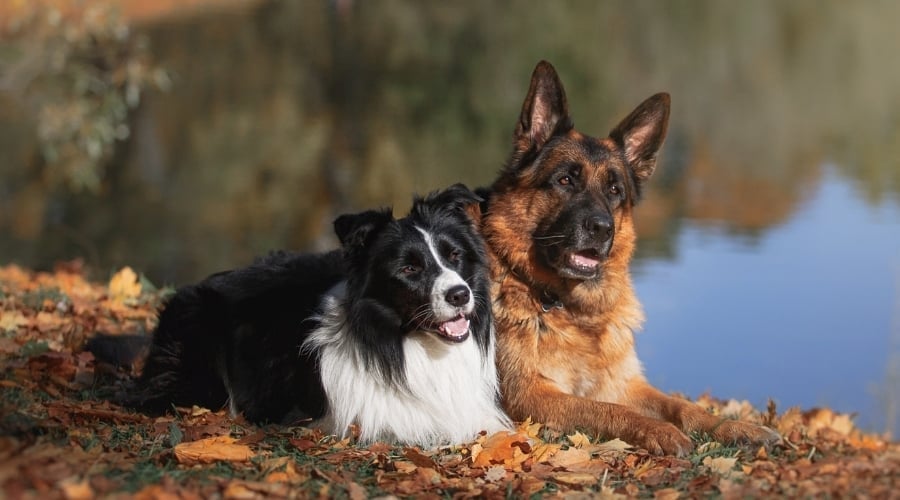
Both breeds are highly intelligent, so they will quickly learn commands during training sessions. Border Collies excel at agility training and other activities, while German Shepherds lend themselves more to law enforcement, police work, and other jobs.
Their intelligent demeanors mean they can pick up on commands and rules to follow fairly easily. It’s important to train both of them as early as possible. They can understand good behavior at a young age. Neglecting their training can lead to unhappiness and aggressiveness.
Crate training is recommended for both breeds. Border Collies can be trained in a 36-inch dog crate, while German Shepherds need a 42-inch dog crate at a minimum due to their larger stature. Crate training can help your dog understand when it’s time to “settle down” and give them a secure location to sleep at night.
Both breeds need early socialization. They need to get used to being around other people, especially the members of their household. They can both also take to basic obedience training. Teach your dog how to sit, come, and lay down at a young age. You might consider finding an obedience school to give them a thorough regimen.
Their work backgrounds help explain their ease of trainability. Both dogs were bred to perform tasks and assist their masters. Even if yours is spending more time chasing after a tennis ball than herding sheep, those traits are still innately part of them.
Who you adopt from is also very important. If you’re adopting from a breeder, you should ensure their dogs have a reputation for happiness and friendliness. Usually, dogs that have aggressive demeanors are not used for breeding purposes by most reputable breeders.
Health

Both dogs tend to be quite healthy. However, they can both contend with some genetic health issues. German Shepherds typically live between 7 and 10 years. It is possible for one to live as long as 13 years. Border Collies tend to have longer lifespans, between 12 and 15 years.
Each breed can suffer from hip dysplasia as well as Progressive Retinal Atrophy (PRA). German Shepherds are at risk for more conditions overall, including Hemangiosarcoma, a form of cancer common in the breed. They are also at risk for bloat, which is something you can have preemptive surgery to correct if you choose.
Border Collies have to contend with Osteochondritis dissecans, a joint ailment in which loss of blood flow causes a bone under the cartilage to die. Some of the other conditions they can face include epilepsy, deafness, and neuronal ceroid lipofuscinosis.
Nutrition

Both breeds will require high-quality dog foods packed with nutrients. The kind of dog food they need will depend on their age and current health needs. Selecting the right food for your pup will often come down to accessibility and budget. We always recommend purchasing the highest quality nutrition you can afford, especially during your dog’s puppy stage when you are laying the building blocks for their development.
Border Collies will consume less dog food between the two breeds. They are smaller in stature and will typically eat about 2 to 2.5 cups of high-quality dog food each day. An active dog may eat slightly more than this, and it should be split up into two or three different feedings so that your pup doesn’t over-consume.
German Shepherds will eat slightly more dog food on average because of their size. You can expect a fully developed dog to consume around 3 cups per day. Active dogs will consume more and should be fed with split feeding times to ensure their weight doesn’t become an issue. You may want to consider food with a higher amount of glucosamine due to the potential of hip issues in the breed later in life.
Grooming
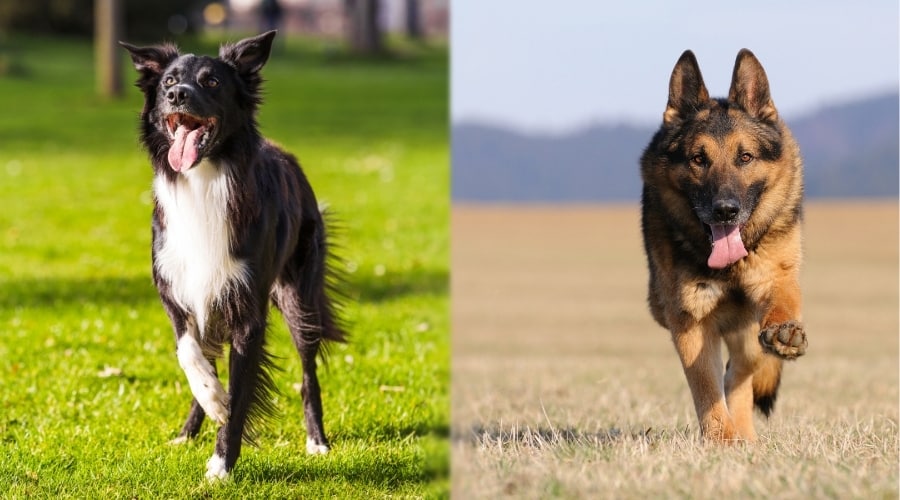
Both breeds have longer double coats, and both shed frequently. If you are looking for a low-maintenance dog in the grooming department, you may want to consider a different dog. Their coat length will influence how often they need grooming. Typically, long-haired dogs will require additional grooming, regardless of the breed.
German Shepherds will appear to shed less if they have a shorter coat. They shed about the same, regardless of coat length, but long-haired dogs will “feel” like they shed more because their fur is easier to see.
Border Collies shed about the same amount, and the visibility of their fur around your home will depend on many factors, including the color of your floors, furniture, and clothes. It may feel like the Border sheds more because of the consistency of its fur, which is known to stick to just about everything it can cling to.
Both dogs will need weekly pin brushing to keep their coats healthy and clean. German Shepherds require more brushing, as they tend to shed more than Border Collies. However, Border Collies also go through periods of heavy shedding.
Neither breed requires bathing weekly or even monthly. A recommended bathing routine will have you bathing either dog about every eight to 12 weeks. This helps to keep their coats clean and get rid of any lingering odors. As long as they are well cared for, neither dog is notorious for being smelly.
Puppy Prices
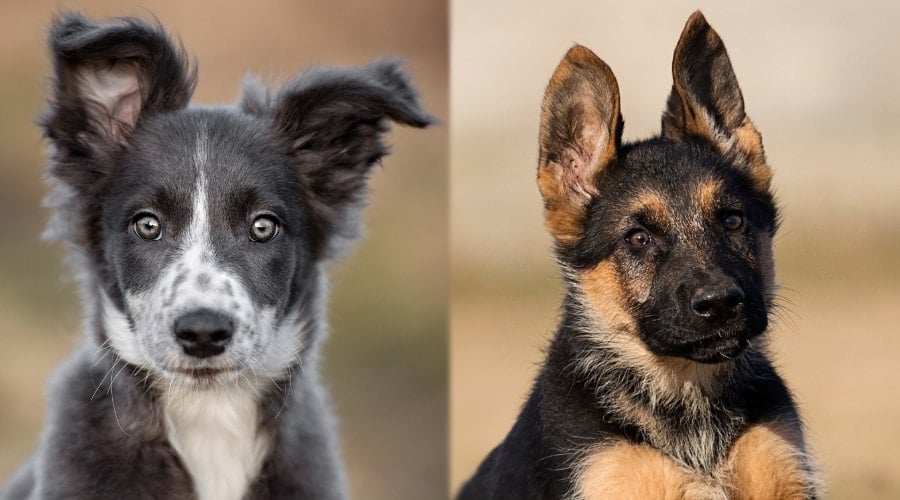
Prices can make a difference if you’re adopting either breed as a puppy. Adopting either of these dogs can be a fairly pricey process. The more reputable the breeder, the higher the price might be.
German Shepherds tend to fetch a higher price for puppies. The average cost of a purebred puppy is between $1,000 and $2,000. Expect to pay even more if your dog comes from a more prestigious lineage.
For Border Collie puppies, the average price is around $1,000 and up. You’ll also pay a premium for a show dog, but they are typically less on average than a purebred German Shepherd.
Don’t let yourself be swayed by a breeder just because they are offering puppies at a low cost. Make sure that any place you consider is properly credentialed and recommended. Cheaper puppies can come from backyard breeders or puppy mills. When adopting a dog, your puppy should be set up for success in life, which means coming from a lineage that doesn’t carry potential health risks.
Final Thoughts
German Shepherds and Border Collies are both excellent choices, depending on the family they are going home to. They have fairly similar temperaments, even if their looks are pretty far apart. Both breeds are amongst the smartest around. However, you need to make sure they’re in a situation where they can have their intelligence and sweet dispositions nurtured.
A German Shepherd might not live as long and suffer from more ailments. Either breed can learn proper discipline through obedience training, and they both are equally independent. At their best, both breeds can be great protectors and means of support. They can also make your household an even more loving environment.
Consider another breed if you haven’t raised a dog before. While both breeds are great pets, they can also be very demanding. They need plenty of exercise and plenty of attention. Space requirements are also very important for Border Collies and German Shepherds. Do not let yours be cooped up in an apartment with minimal opportunities to get fresh air.


